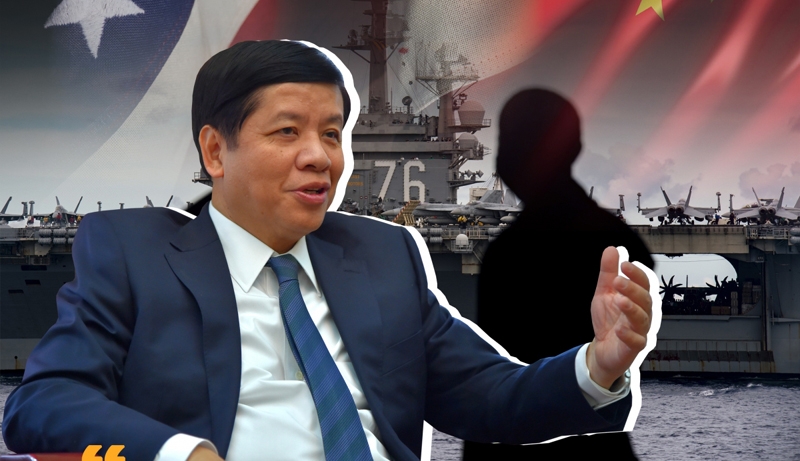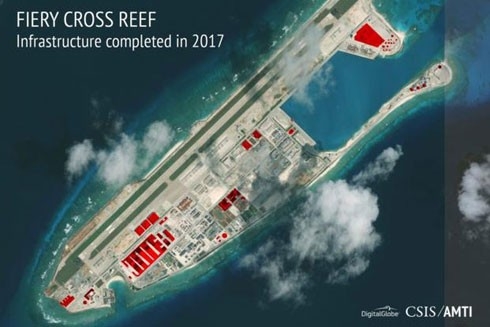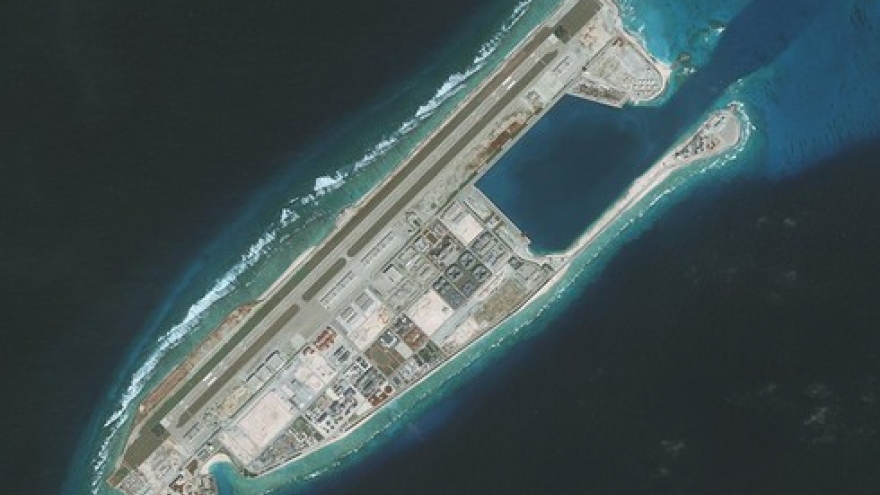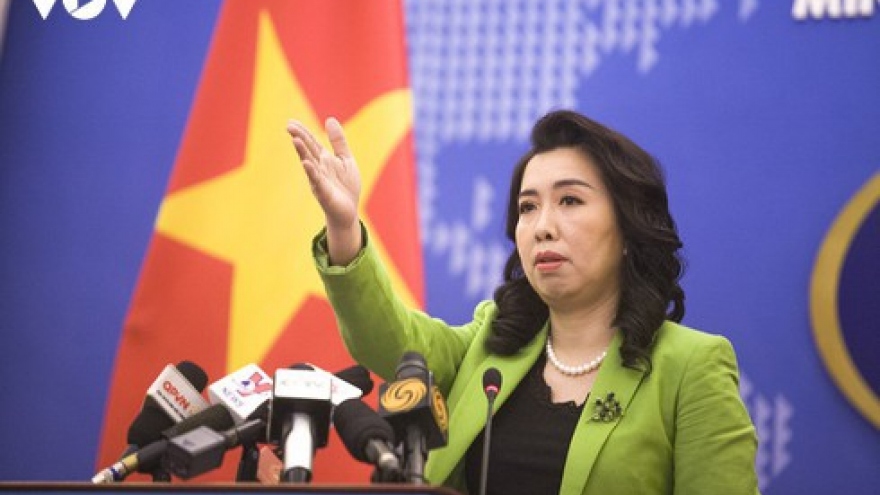China’s unlawful East Sea claims under fire internationally
VOV.VN - China’s South China Sea sovereignty claims have endured strong criticism from various countries globally, including the United States and Australia, which state that these claims are both groundless and unlawful.
During the course of June and July, plenty of countries released statements or sent notes to the United Nations, announcing a rejection of China’s unjustifiable sovereignty claims over the South China Sea, known as the East Sea in Vietnam, in the strongest manner possible.
The US strongly criticizes China’s unlawful claims

The US State Department on July 13 published on its website Secretary Mike Pompeo’s statement, which rejected the majority of the northern neighbour’s sovereignty claims in the East Sea. Based on this, Washington asserts that Beijing has no legal basis for its “nine-dashed line” claims, arguing that China’s ‘predatory world view’ has no place in the 21st century.
“The world will not allow Beijing to treat the South China Sea as its maritime empire. America stands with our Southeast Asian allies and partners in protecting their sovereign rights to offshore resources, consistent with their rights and obligations under international law,” the statement read.
The US view is similar to that of the ruling made by the Permanent Court of Arbitration in the Hague on July 12, 2016 constituted under the 1982 UN Convention of the Law of the Sea (UNCLOS 1982), a verdict that rejected China’s maritime claims as having no basis in terms of international law.
The court ruled that:
· China’s claims to historic rights and resources within its nine-dash line have no legal basis.15
· None of China’s claimed land features around the Spratly Islands are capable of generating a 200-nm exclusive economic zone.
· China violated the sovereign rights of the Philippines by interfering with Philippine oil exploration activities. In addition, they banned local fishing vessels from operating, failing to prevent Chinese fishing vessels from operating, and conducted land reclamation in areas where the Philippines usually enjoys sovereign rights to explore and exploit natural resources.
· China also violated its marine environmental protection obligations under the UNCLOS by causing “severe harm to the coral reef environment”, with its policy of pushing land reclamation activities and harvesting endangered species.

The US changes its stance toward China
Commenting on Secretary Pompeo’s statement, Greg Poling, director of the Asia Maritime Transparency Initiative at the US-based Center for Strategic & International Studies, said the US supports countries that signed the UNCLOS 1982. According to Poling, all US administrations since the Reagan Government considered the UNCLOS 1982 to be an instrument of international law when it comes to resolving problems at sea.
As such, the US has always complied with the UNCLOS, although the Senate has yet to ratify the document to become an official member of the convention. Simultaneously, China has ratified but is yet to comply with the convention.
Therefore, the US is capable of criticising China on the overall terms of the convention, Poling said, noting that the legal reality is irreversible.
Ambassador, Assoc. Prof. & Dr. Nguyen Hong Thao, an expert on international law, outlined that the US administrations in their previous statements had often denounced China for their acts of provocation and aggression. Following the announcement of Pompeo’s latest statement, the US has altered its stance, with some previously diplomatic wording becoming harsh to reflect direct criticism.
Concurring with Dr. Thao’s view, Ambassador Nguyen Quoc Cuong, former Deputy Foreign Minister of Vietnam, told VOV in a recent interview that previously the US would ‘not take sides’ in sovereignty claims in the East Sea. Indeed, the only thing it cared about was how freedom of navigation and overflight in the East Sea could be maintained. Due to these policies, the US had almost never publicly spoken out against China’s unlawful sovereign claims that is pursues under the so-called ‘nine-dashed line’.
“When I was Ambassador to the United States, I had repeatedly told officials in Washington that the US knew China’s claims over the ‘nine-dash line’ in the East Sea were completely contrary to international law and the UNCLOS 1982. But the US then maintained a ‘neutral’ stance on the territorial claims of other countries, including the legitimate claims of Vietnam, as well as the illegal claims of China. It seems that a neutral stance by the US is not clear and strong enough,” Ambassador Cuong added.

According to the diplomat, Secretary Pompeo’s strong statement marks an important change in the US’s policy in the East Sea, with the US moving away from its neutral position. Most notably, sovereign claims, sovereign rights, and jurisdiction, as well as the actual action of all claimants in the East Sea, must be in accordance with international law, and the UNCLOS 1982, without exception. Only then is it possible to find peace, stability, security, safety, freedom of navigation, and flights maintained in the East Sea and the wider region.
Ambassador Cuong added that, “I also eye the speech of US Assistant Secretary of State David Stilwell that the US opened up the possibility of sanctioning Chinese officials and companies for illegal acts in the East Sea. This means, that in addition to tougher statements, the US is poised to take an even more aggressive stance in response to China’s violations of international law that has been occurring in the East Sea.
In terms of action, the US is typically not afraid to follow through on its proposals. The US Department of State and the US Department of Commerce announced on August 26 that sanctions will be imposed on 24 firms and dozens of Chinese individuals that participate in the illegal transformation and militarisation of features in the East Sea. The US Department of State therefore called on all countries to reconsider their relationships with, whilst also assessing the risks of dealing with these Chinese firms and individuals.
Australia issues strong words on China

Alongside the US, July 24 saw Australia send a note to the United Nations to officially reject China’s claims to “historic rights” and “maritime rights and interests” established by the “historical practice” in the East Sea.
In arguing their case, Australia stated that China had “no legal basis… to draw straight baselines connecting the outermost points of maritime features or ‘island groups’ in the East Sea”, with specific reference made to what China calls the “four sha”, made up of the the Pratas islands, Macclesfield Bank, the Paracel islands, and the Spratly islands.
Australia also rejected China’s claims to “internal waters, territorial sea, an exclusive economic zone, and continental shifts based on such straight baselines between places.”
In the note, Australia issued a rejection of the Chinese assertions to maritime zones generated by submerged features such as low-tide elevations. It further rejected claims to maritime zones based on the artificial transformation of natural features, declaring that it “does not accept artificially transformed features can ever acquire the status of an island.”
The Australian Government expressed their “strong concern” over assertions made by China that it had “continuously and effectively” exercised sovereignty over low tide elevations. One particularly aspect is that tide elevations “do not form part of the land territory of a State.”
Moreover, between June and July, Indonesia and Malaysia also issued notes to denounce China’s unlawful claims in the East Sea. Even Brunei, the most silent country among the East Sea claimants, also voiced their strong support for negotiations that follow the guidance of the UNCLOS 1982, as well as the rules and principles set out in international law.
Four years following the ruling of the Permanent Court of Arbitration, the East Sea has rapidly become the most contentious issue globally, with the northern neighbour coming under fire for its aggressive actions in the region.



